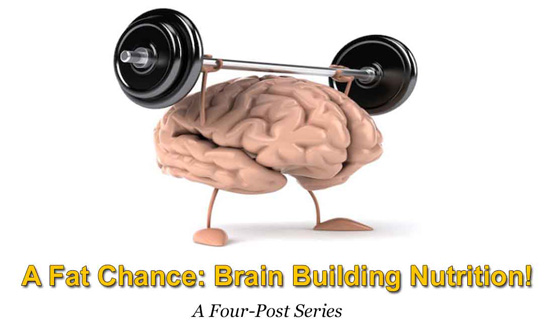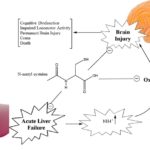A Fat Chance (Part FOUR): Fat, the Neuroprotector!

Notice: This is the fourth article in an ongoing series. Make sure to check out the previous articles before reading this one.
-
- A Fat Chance (Part ONE): Introduction
- A Fat Chance (Part TWO): How and Why I Eat so Much Fat!
- A Fat Chance (Part THREE): The Nitty Gritty Science of the Metabolism of Fat
- A Fat Chance (Part Four): Fat, the Neuroprotector!
The specific mechanisms that explain WHY a ketogenic diet is neuroprotective are not yet well defined, but there is no doubt that this diet IS neuroprotective 4, 13, 5, 18. In observations of those practicing a high fat diet, ketone bodies can make up more than half of the metabolic fuel for neurons (the other being glucose). Although ketone bodies are available from the bloodstream in a high fat diet, local brain made (astrocytic genesis) ketone bodies from fatty acids are available in large amounts within the brain when one practices a ketogenic diet 14. This means that the brain can obtain an abundant amount of energy from a high fat diet.
Based on several studies at Emory University School of Medicine, it seems like neuroprotection may result from the altering of genes that is involved in energy metabolism in the brain 15. Because the fuel source of glucose seems to be the metabolic fuel that is responsible for seizures and convulsant activity, changing the metabolism of the brain to use ketones, through a diet that is high in fat rather than sugar/carbohydrates, seems to be the main mechanism that prevents epileptic seizures 14. In addition to these proposed mechanisms, this alternate fuel source (ketones) may also provide antioxidant activity, which is able to “disarm” free radicals that oxidize, or age, the brain and body rapidly. What’s more, this pathway also seems to protect against the cell death of neurons from toxins that humans are now regularly exposed to, and which chemically overstimulate neurons to death (excitotoxicity) 4, 13.
Breaking it Down: Metabolizing this Article
Let’s imagine my brain and body as a car, and food as its fuel. A well practiced, ancestral based, high fat and low carbohydrate diet seemed to change the fuel source of my brain and body to a much more efficient and slower burning fuel that gave me better gas mileage, is neuroprotective in many ways, and that has seemed to have made me an even more efficient fat burner.
Transitions are difficult. In my opinion, this transition was certainly 100% worth it for my own overall personal health and well being. The bottom line is that the ketogenic diet that I adopted, one that incorporates a real food and evolutionary approach, seemed to be beneficial to my brain and body after I had minimized inflammation and was able to endure the stress of transitioning my metabolism.
The majority of the US population is currently fueled by carbohydrates and sugar, and it seems as though THIS is one of the reasons for the increase in obesity and chronic health problems 7. We seem to be able to change our metabolism so that, not only are we able to eat much more fat, but that we are also able to BURN FAR MORE FAT as well.
Many studies on the neuroprotective effects of a ketogenic diet imply that most people’s metabolisms (those which are adapted to use carbohydrates and sugar for energy) may be supplying fuel to the fire of seizure activity while also aging the brain at a faster pace. It also seems that the switch to a high fat diet, over time, may alter the genes to be able to more effectively obtain fuel from fat, while protecting the brain from damage.
I want to stress that I am not suggesting that everyone should eat in this manner. I believe that, without testing, each person possesses the most information as far as what works for them, and that an optimal diet must be personalized, as metabolism is influenced by genetics, neurological factors, digestive condition, bile production, and likely other factors. Since transitioning my own metabolism, the amount of fat and carbohydrates that I eat today fluctuates based on my cravings and activity levels. I probably eat far more non-starchy vegetables today, lowering the ratio of fat that I consume. I am sharing my experience and bringing studies forth to help others get over their fat phobias that have been instilled in our culture for a very long time. I hope that this article will support TBI survivors, caretakers, or anyone who is suffering, or who has a friend or family member who is suffering, from any neurological condition. I am also writing to anyone who may be interested in optimizing their brain function to look into the literature and to decide for themselves if a higher fat and lower carbohydrate diet makes sense for them to try. I very much encourage comments and questions below.
With my own brain injury, it felt, and still feels, very important to support my brain as much as possible. Again, I choose my therapies based on weighing the possible benefits vs. risks and unknowns. At first, it seemed risky to eat a very high fat diet, but after reading and understanding the literature about this high fat therapy, I became convinced that the possible benefits of it outweighed the risks and unknowns by a long shot! Many connections within my brain have been damaged, but I began to see that there were ways for me to supply even more of the nutrients that my brain seemed to need. The brilliant people that I had met and the enlightening information that they had helped me to gather had given me a chance… it had given me A FAT CHANCE.
*An enormous thank you to Dr. Richard Feinman, Jimmy Moore, and Rachel Flowers for their assistance with this post series!
- Resources:
- http://www.jlr.org/content/6/4/537.short
- http://www.merriam-webster.com/dictionary/diet
- http://youtu.be/2_8D1hH7mzo
- http://www.ncbi.nlm.nih.gov/pubmed/16940764
- http://www.pediatricsdigest.mobi/content/109/5/780.short
- http://medical-dictionary.thefreedictionary.com/homeostasis
- http://www.cdc.gov/chronicdisease/resources/publications/AAG/ddt.htm
- http://www.diabetes.org/food-and-fitness/food/planning-meals/carb-counting/carbohydrates-and-diabetes.html
- https://www.inkling.com/read/marks-medical-biochemistry-lieberman-marks-4th/chapter-26/section-five-carbohydrate
- http://jn.nutrition.org/content/132/7/1879.short
- https://www.inkling.com/read/marks-medical-biochemistry-lieberman-marks-4th/chapter-26/section-five-carbohydrate
- McHenry, H.M (2009). “Human Evolution”. In Michael Ruse & Joseph Travis. Evolution: The First Four Billion Years. Cambridge, Massachusetts: The Belknap Press of Harvard University Press. p. 265. ISBN 978-0-674-03175-3.
- http://www.sott.net/article/249143-Ketogenic-Diet-high-fat-low-carb-Has-Neuroprotective-and-Disease-modifying-Effects
- http://www.jle.com/e-docs/00/04/37/EE/article.phtml
- http://www.sciencedaily.com/releases/2005/11/051114220938.htm
- Akoh, Casimir and Min, David. Food Lipids Chemistry, Nutrition, and Biotechnology. 2nd Ed. New York: Marcel Dekker, Inc., 2002. 273-276. Print. <http://www.stu.edu.vn/uploads/documents/030509-215944.pdf>.
- http://www.jlr.org/content/6/4/537.short
- http://www.sciencedirect.com/science/article/pii/S0165017308001045
- http://www.ketogenic-diet-resource.com/acid-reflux-diet.html
- http://www.ncbi.nlm.nih.gov/pmc/articles/PMC3480864/
- http://fr.canolacouncil.org/media/515239/canola_oil_physical_chemical_properties_1.pdf
- http://care.diabetesjournals.org/content/14/9/824.short
- http://www.jlr.org/content/6/4/537.short




